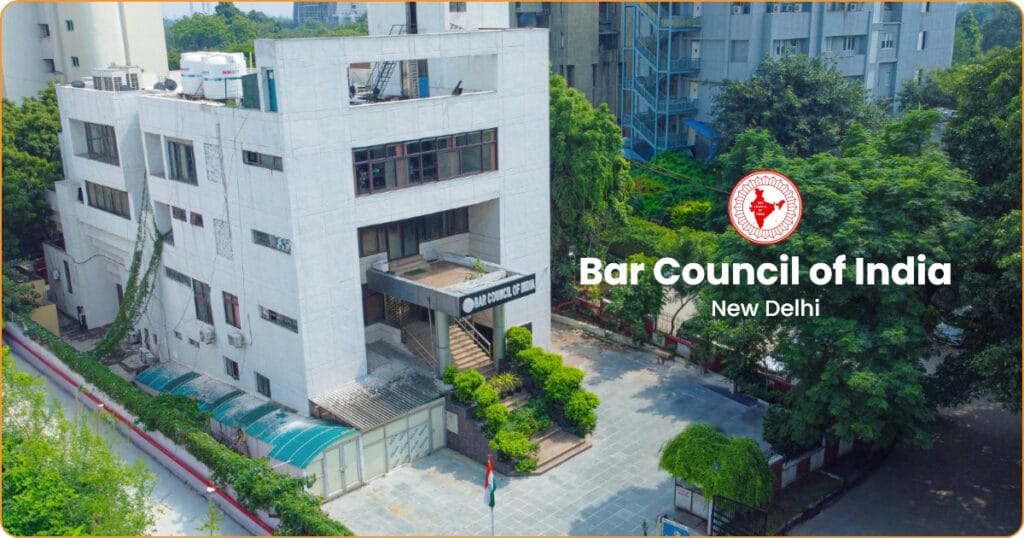
Can the Bar Council of India Inspect Law Colleges?
The function of the Bar Council of India (BCI) goes much beyond the regulation of lawyers. One of the significant questions that have been posed in recent decades is whether the BCI can inspect law colleges. This is at the nexus of legal education, regulatory powers, and the standard of legal training in India. The debate is about comprehending the statutory powers of the Bar Council of India, its role in regulating legal education, and the effect that inspections can have on ensuring high standards in law colleges throughout the nation.
Introduction
Legal education in India has expanded exponentially over the past few decades. As more law colleges are being set up, it has become a pressing issue to make sure that such institutions are maintaining the right standards. The Bar Council of India, being the supreme regulatory body for the legal profession, has the mandate of laying down and enforcing the standards for legal education. Inspection is one of the means by which it can be made sure that law colleges adhere to these standards. However, questions remain about the scope of the BCI’s powers in this regard. Can the Bar Council of India, by its legal mandate, inspect law colleges? This article explores the legal framework, historical context, practical considerations, and controversies surrounding the inspection of law colleges by the BCI.
The Role of the Bar Council of India in Legal Education
The Bar Council of India was established under the Advocates Act, 1961. The primary role of the BCI is to regulate the legal profession, which includes maintaining standards of professional conduct among lawyers and safeguarding the interests of both the profession and the public. Over time, the BCI’s mandate has expanded to include the regulation of legal education. The body is also tasked with establishing standards for legal education and giving approval to law colleges. The BCI lays down rules that law colleges have to abide by in their curriculum, infrastructure, teacher qualifications, and student enrollments. This regulatory control is meant to make sure that students graduating from law colleges are adequately equipped to join the legal profession.
For More Updates & Regular Notes Join Our Whats App Group (https://chat.whatsapp.com/DkucckgAEJbCtXwXr2yIt0) and Telegram Group ( https://t.me/legalmaestroeducators ) contact@legalmaestros.com.
Besides establishing these standards, the BCI is also tasked with ensuring compliance. One of the ways compliance can be ensured is through inspections. Inspections can determine areas of infrastructure deficiency, teaching techniques, and overall compliance with the stipulated norms. The role of the BCI in this regard is crucial, as it has a direct impact on the quality of legal education and, by extension, the quality of legal practitioners in the nation.
For More Updates & Regular Notes Join Our Whats App Group (https://chat.whatsapp.com/DkucckgAEJbCtXwXr2yIt0) and Telegram Group ( https://t.me/legalmaestroeducators )
Legal Foundation for the Inspection of Law Colleges
The legal foundation for the inspection of law colleges by the Bar Council of India is contained in the laws and regulations that regulate legal education in India. The Advocates Act, combined with the Bar Council of India Rules, gives the BCI a basis on which it works. Even though the Act specifically deals with regulating the legal profession, its interpretation has resulted in the BCI being understood as having a mandate to regulate legal education. This involves ensuring law colleges have minimum standards required to provide quality legal education.
Additionally, several of the rules and guidelines promulgated by the BCI categorically state the need for law colleges to be inspected periodically. These inspections aim to ensure that colleges are complying with the given norms in the case of infrastructure, credentials of the faculty, and academic courses. Although the legal documents rarely make use of the word “inspection,” the authorities given to the BCI suggest that it is entitled to check compliance either by on-spot inspection or through record audits at the institution.
In practice, the BCI has previously inspected and taken disciplinary action against law colleges that did not meet its standards. This has included warning institutions to, in the worst-case scenario, strip institutions that consistently did not meet set standards of their recognition.
Arguments Supporting the Inspection of Law Colleges
Proponents of granting the BCI the right to inspect law colleges are of the view that inspections are necessary in order to guarantee quality education. They believe that law is a calling that is associated with huge responsibility, and it is imperative that those entering this profession receive proper training. Inspections are a means of holding people accountable so that law colleges do not compromise on education in a bid to attract more students or lower operating expenses.
Supporters are of the view that BCI inspections keep the playing field level across institutions by making sure that every law college follows the same rules and standards. They say that without inspections, there is a possibility that some colleges may end up offering poor quality education, thus influencing the overall standard of legal practitioners. By performing inspections, the BCI is able to determine shortcomings and collaborate with colleges to correct them, ultimately leading to legal education being enhanced in the nation.
Furthermore, regular inspections by a central authority like the BCI can help in harmonizing legal education standards across various regions. Given that legal education in India varies widely in quality and resources, inspections can serve as a means to ensure that even colleges in remote areas meet the minimum requirements. This uniformity is essential not only for the credibility of the legal profession but also for the equitable development of the country’s legal infrastructure.
Arguments and Concerns Regarding the Inspection
Conversely, opponents of granting the BCI blanket powers to inspect law colleges are wary of overreach. One of the key concerns is that law colleges are basically educational institutions and should be regulated by educational bodies and not a professional body. Opponents argue that the participation of the BCI in the academic sphere may create tensions between educational priorities and professional rules.
A few critics also suggest that BCI inspections could result in bureaucratic slowness and mounting administrative burdens on law colleges. They fear that more frequent inspections could take time away from and distract from key educational work. There is also a fear that the standards employed by the BCI for inspection may not always be revised to keep pace with the quickly evolving context of legal education. At a time when technology and innovative approaches to teaching are revolutionizing learning, strict inspection criteria could kill creativity and innovation in law schools.
Another critical issue is political interference. It is the critics’ claim that if the BCI, in some respects perceived as vulnerable to political agendas, were granted absolute power to inspect and regulate law colleges, it could result in decisions made more according to political rather than educational quality. This may lead to a scenario where law schools are penalized for issues that are not so much academic or professional in nature, thus compromising the autonomy of institutions.
The Role of State Authorities and Accreditation Bodies
Apart from the BCI, state governments and independent accrediting agencies are also involved in the regulation of legal education quality. Most states have their own education boards, which frame standards for higher education institutions, including law colleges. Independent accrediting agencies also rate the quality of these institutions on the basis of a variety of parameters, which encompass academic standards, infrastructure, and teacher quality.
The fact that there are several layers of surveillance has led to the issue of whether the BCI ought to be the only one tasked with inspecting law colleges. Others have expressed the view that the BCI, state agencies, and autonomous accreditation agencies working in partnership could create a more symbiotic and holistic system of surveillance. This would permit a balance of regulatory oversight and scholarly examination that would hold law schools to high standards and also encourage them to innovate and develop.
Practical Considerations and Recent Developments
The recent controversies in the matter of reforms in legal education have focussed attention on this issue. Debate in legal circles, educational circles, and in the press has been concentrated around examples where bad legal education resulted in under-trained graduates going into the profession. In those situations, the intervention of the BCI to inspect law colleges has been perceived as a desirable step to guard against the compromising of the standard of legal education.
There have been cases where the BCI took remedial actions against law schools that did not live up to the standards. These sometimes involved suspensions of admissions for a period or orders to correct certain areas of the curriculum. Such interventions have usually provoked conflicting responses. They are welcomed by those who regard them as necessary to ensure the upholding of the integrity of the legal profession. Others treat them as undue interference and signs that the BCI is crossing its limits.
In addition, continuous evolution in legal education, particularly with regard to emerging technological and new pedagogical developments, calls for adaptive regulation. The BCI is required to continually adjust inspection parameters so as to stay useful and functional. It implies that whatever the process of inspection might be, there needs to be regular checking of that process in relation to changing best practices in legal education. Here, the issue is not just whether the BCI can audit law colleges but also on what terms such audits are to be done in a way that is supportive of continuous improvement over punitive regulation.
Balancing Quality Assurance with Institutional Autonomy
The key issue in this debate is how to balance ensuring quality education with maintaining the autonomy of educational institutions. On the one hand, quality assurance by inspection is necessary to safeguard the interests of the public and the students. On the other hand, law colleges need the independence to innovate and change without being held back by too stringent regulatory requirements.
A balanced system might entail setting proper, transparent, and current standards to which law colleges would be required to comply, and an all-stakeholder-involved review process undertaken from time to time. It would not only serve to uphold high standards in legal education but also allow for the opportunity for colleges to conform to new innovations in the sector. Coordination among the BCI, state board of education, and autonomous accrediting bodies has the potential to generate a more comprehensive assessment of law colleges. This collaboration would ensure that regulatory actions are equitable, impartial, and favorable to the betterment of legal education.




